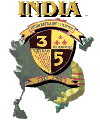|
The letter would be thirty-five years old. I'm sure
my mother has it, but I don't want to comb through all her
letters, to have my brother made real again and the grief
fresh. I don't need to see the letter anyway; I've never
forgotten my brother's words.
Earlier letters described the details of his life, anecdotes
about buddies, complaints about officers, and requests for care
packages from home. Other letters had tried to reassure us, even
made light of his experiences. An eighteen year old
volunteer Marine, Tink joked about his first encounter with the Viet Cong. The bullets were real, he'd said, and
his image of himself as John Wayne was the first casualty.
The letter I can't forget, though, described the paradox of
combat in Vietnam. By daylight, Tink wrote, he and his buddies
entered a village, were greeted as friends, were surrounded by
children smiling and asking the Americans for chocolate. The
villagers were so poor, he'd said. And then the night came, and
the Marines took fire from these same villagers. The next
day, the Marines burned the village to the ground.
It was hard, he'd said. He had requested duty in Vietnam,
but that wasn't the war he'd come to fight. He'd gone to
Vietnam full of the glorified visions of war our father had
planted in his mind, believing every word of praise for the
Marine Corps he'd heard as a child. He'd gone, no doubt, thinking of himself
as the heroic liberator of all the World War II movies he'd ever
seen, all the books he'd read.
I cried for him then, for the inhumanity of the war, for
the injustice of it, for the irony of it. With the luxurious idealism of
a
fifteen-year-old, adoring sister, with the foolish arrogance of
one who did not grasp the real danger, I responded.
I don't worry for your safety. I know
nothing will happen to you. I do worry, though, that you
will be changed forever by this experience. I hate to
think of you seeing these horrors. I hate to think of how
this must hurt you. I worry about how tough you have to
become. A month later, Tink was dead.
We were all still asleep when the doorbell rang. My mother
went to the door; we heard her unbearable moan before she opened
the door. She could see the Marine uniform through the
glass side panels and knew what he'd come to tell us. Underneath
the disbelief, the overwhelming grief, the fear that if death
could take this brother I loved, it could claim others I loved
at any time, the guilt is what I remember. I hadn't
worried for his safety. I'd worried for his soul. I'd tempted
fate with my stupidity and naiveté. The bullets were
real, and my brother was the casualty. And I hadn't even been
afraid of that.
The ghosts of Vietnam were stirring among my family members
before Senator Kerrey's story made the news. The pain
endured by the families of those held hostage in China had
reawakened my mother's grief. While it was the outcome she
had prayed for, their safe return stood in stark contrast to the return of her own son so long ago. A coffin that could
not be opened, her search for the truth in the months that
followed, the implications of his buddies' inability to talk to
her of how Tink died, her anguish that she was not there to
cradle her son as he died -- all surfaced. Why, she asks,
couldn't her son have come home to his family's embraces? Why
couldn't she have celebrated a reunion like the one those
families in Washington celebrated in April? Why hasn't the grief diminished with
the years?
Another
brother has spent the past year researching and creating a web
site about Tink. He has located Marines who served with
Tink; he may provide my mother with the details she must know,
no matter how terrible. She still feels somehow disconnected
from her son's death, she says. She seems to think knowing all she can about it will bring her closer to him.
I imagine she feels that if she experiences the horror
even now, it will mean he was not alone. I think she
believes that in some bizarre warp of time, sharing the pain of
his final moments might even reduce it for him. That may
not be rational, but it may still be true in its own way. What
good has it ever been to view this war from a rational
perspective, anyway?
And then Bob Kerrey's story appeared. I have no
intellectual response. I only feel it in my gut. I
do not wish to judge; I will not pretend to know more than he or
any other veteran does.
Except for this: Kerrey says that dying is not the most
difficult thing one does for one's country, killing is. I, too,
believed that long ago. Maybe I still do. But dying
is the most difficult thing for the survivors. And I'm
still ashamed that I worried more about the death of my
brother's innocence than about the death that still torments my
mother. I'd trade a living brother with nightmarish memories for
the one we buried, the one whose body they wrapped in so many layers to prevent us seeing him, the one who
might have survived if his innocence had died first.
Bonnie
Arnold-Wenngren |

